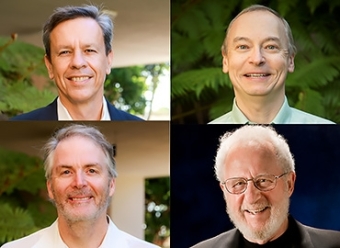
Four professors in UC Santa Barbara’s College of Engineering are among the most influential scientists in the world, according to the 2018 Highly Cited Researchers List released by Clarivate Analytics. The list includes 6,000 scientists whose research ranked among the top one percent in terms of references and citations in journals from 2006 through 2016. Nineteen current or former UCSB scientists are on the 2018 list, including four presently affiliated with the Materials Department: Guillermo Bazan, Craig Hawker, Alan Heeger, andChris Van de Walle.
“These four prestigious members of our faculty made discoveries and translated them into applications that have the potential to change the world, from innovative polymers to molecular and materials design,” said Rod Alferness, dean of the UCSB College of Engineering. “Members of the scientific community who have cited their work benefits from their intellectual contributions, and their work propels us toward a brighter future. We are tremendously proud.”
Bazan, Hawker, and Heeger have appeared on the Highly Cited Researchers List each of the last five years. Van de Walle was on it previously in 2014 and 2017.
“The Materials Department prides itself on performing cutting-edge research that sets new directions in materials science and engineering. The fact that so many faculty within our relatively small department are included on the list is a great indicator of our large-scale influence on the field,” said Van de Walle, whose group performs computational research to develop a fundamental understanding of the physics and chemistry of materials in order to improve existing materials and discover new ones.
According to ResearcherID provided by Clarivate Analytics, Van de Walle has published nearly 500 articles that received nearly 36,000 citations.
“As researchers, we all strive to have an impact. When our papers are cited, we know that other researchers found the results valuable and built on them in their own work. Citation numbers therefore offer an important metric, and to find out that one ranks among the top one percent is very gratifying,” said Van de Walle, an elected member of the National Academy of Engineering (NAE), and a fellow of the Institute of Electrical and Electronics Engineers (IEEE), the American Association for the Advancement of Science (AAAS), the Materials Research Society (MRS), and the American Physical Society (APS).
Heeger, one of 17 Nobel laureates on this year’s list, received the Nobel Prize in Chemistry in 2000 for pioneering research that made him a co-founder of the field of semiconducting and metallic polymers. His nearly 1,000 publications in scientific journals, have been cited more than 53,000 times according to Research Gate. Heeger has also received the Oliver E. Buckley Prize for Condensed Matter Physics and the Balzan Prize for the Science of New Materials, and has been elected to the National Academy of Science (NAS), the National Academy of Engineering (NAE), the Korean Academy of Science, and the Chinese Academy of Science.
Bazan’s research group focuses on the molecular design and synthesis of innovative and functional materials that can be used in organic electronics, bioelectrochemical devices, and industrially relevant polymer chemistry. He has received important awards from the American Chemical Society and the National Science Foundation, and is a fellow of the Royal Society of Chemistry and the American Association for the Advancement of Science. Bazan’s nearly 600 published articles in scientific journals have received more than 45,000 citations. His work was cited nearly 4,500 times each year between 2014-17.
Hawker, who has appointments in materials, chemistry, and biochemistry at UCSB, conducts research involving the design and synthesis of macromolecular structures and polymeric thin films, and the controlled assembly of nanoparticles. His work finds applications in a wide variety of fields, from more efficient energy and data storage to improved semiconductor technology and advanced biotechnology. The author of more than 500 articles, Hawker has been cited nearly 50,000 times. Hawker’s numerous honors and awards include election into Britain's Royal Society, the National Academy of Inventors, the American Chemical Society, the American Academy of Arts and Sciences, and the American Association for the Advancement of Science.
Placing four Materials professors on this year’s list echoed the results of the CWTS Leiden Rankings that found no other public university in the world had a greater scientific impact in engineering and physical sciences than UCSB. UCSB has ranked No. 1 in the world among public universities in the Leiden Rankings the past four years. The Leiden rankings factor in citations and research to quantify scientific impact and quality of research conducted at universities. Leiden measures the number and proportion of a university’s publications that, compared with other publications in the same field and in the same year, belong to the top one percent of the most frequently cited.
This year’s Highly Cited Researcher List included a new cross-field category to identify researchers with substantial influence across several fields during the past decade. Included in the cross-field category for 2018 are UCSB professors Steven Gaines (marine science), JP Schimel (ecology/botany/biology), Sangwon Suh(ecology), and Anderson Janotti, a former member of the UCSB Materials Department, now at the University of Delaware.
Other UCSB faculty on the 2018 list include: Leon Balents (physics), Andrew Cleland (physics), Benjamin Halpern (environment/ecology), D. Andrew Howell (space science); Carrie V. Kappel (environment/ecology), Thuc-Quyen Nguyen (materials science), Jonathan Schooler (psychology), David Tilman(environment/ecology), and Kevin Lafferty (environment/ecology).
To view the complete list, click here.



